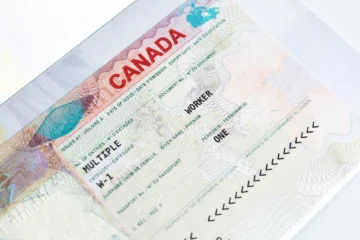Table of contents
Canada, known for its diverse culture and abundant opportunities, is a dream destination for many aspiring professionals worldwide. However, navigating the process of obtaining a work permit can feel like traversing a labyrinth. This comprehensive guide aims to demystify the Canadian work permit application process, providing the knowledge and resources you need to confidently embark on your journey to working in Canada. Whether you’re a seasoned professional or a recent graduate, understanding the intricacies of the application process is the first step towards achieving your Canadian dream.
This guide will walk you through the entire process, from understanding the basics of Canadian work permits to navigating the application process, overcoming common challenges, and making the most of your work permit once you’ve obtained it. We’ll provide you with practical tips, expert insights, and links to authoritative resources to help you confidently navigate the process. Let’s begin.
Understanding the Basics

Before diving into the application process, it’s essential to understand the basics of Canadian work permits. A work permit is a document issued by the Immigration, Refugees and Citizenship Canada (IRCC) that allows a foreign national to work in Canada for a specific time period. It’s important to note that a work permit is not a visa – it doesn’t allow you to enter Canada. You may also need a visitor visa or an Electronic Travel Authorization (eTA).
There are two main types of work permits: open work permits and employer-specific work permits. An open work permit allows you to work for any employer in Canada, except for those who are listed as ineligible or regularly fail to comply with the conditions. On the other hand, an employer-specific work permit allows you to work according to the conditions on your work permit, which include the name of the employer, the location of work, and the duration of employment.
Understanding the type of work permit you need is the first step in your application process. The requirements, processing times, and fees can vary depending on the type of work permit you apply for. For instance, an open work permit might require additional documents and have a longer processing time compared to an employer-specific work permit.
It’s also worth noting that the Canadian government has several programs that allow foreign workers to come to Canada, such as the Temporary Foreign Worker Program (TFWP) and the International Mobility Program (IMP). Each program has its requirements and application process, so it’s crucial to understand which applies to your situation.
What is a Canadian Work Permit?
A Canadian work permit is a legal authorization that allows a foreign national to work in Canada. It is issued by the Immigration, Refugees and Citizenship Canada (IRCC), a federal department responsible for managing the country’s immigration system. The work permit specifies the type of work the holder can perform, the employers they can work for, where they can work, and how long they can work.
Work permits are typically tied to a specific employer and job. This means you can apply for a work permit if you have a job offer from a Canadian employer. However, there are also open work permits that allow you to work for any employer in Canada.
It’s important to note that a work permit is not a visa. While a work permit allows you to work in Canada, it doesn’t grant you entry into the country. Depending on your citizenship, you may also need a Temporary Resident Visa (TRV) or an Electronic Travel Authorization (eTA) to travel to Canada.
Remember, working in Canada without a valid work permit is illegal and can result in serious consequences, including deportation and bans from re-entering Canada.
Types of Work Permits in Canada
In Canada, there are two main types of work permits: open work permits and employer-specific work permits.
- Open Work Permit: This type of work permit is not job-specific. This means you can work for any employer in Canada who is not listed as ineligible on the list of employers who have failed to comply with the conditions. You also don’t need a Labour Market Impact Assessment (LMIA) or a job offer to apply for this type of work permit. However, open work permits are only available in specific situations.
- Employer-specific Work Permit: As the name suggests, this type of work permit is job-specific. It allows you to work according to the conditions on your work permit, which include the name of the employer you can work for, how long you can work, and the location where you can work.
Understanding the differences between these two types of work permits is crucial to determine which one suits your situation best. The type of work permit you apply for will depend on various factors, including your job offer, your employer, and your intended length of stay in Canada.
Other Types of Work Permits
| Type of Work Permit | Description |
|---|---|
| Temporary Foreign Worker Program (TFWP) | For workers needed for positions that cannot be filled by Canadian citizens or permanent residents. It often requires a Labour Market Impact Assessment (LMIA). |
| International Mobility Program (IMP) | Allows employers to hire foreign workers without an LMIA. It includes categories such as intra-company transferees and workers under free trade agreements, such as CUSMA (Canada-United States-Mexico Agreement). |
| Post-Graduation Work Permit (PGWP) | For international students who have completed a program of study in Canada, allowing them to gain Canadian work experience. |
| Spousal/Common-Law Partner Open Work Permit | For spouses or common-law partners of certain work permit holders or full-time students, allowing them to work for any employer in Canada. |
| Bridging Open Work Permit (BOWP) | For certain individuals who are waiting for the final decision on their permanent residence application. |
| Global Talent Stream | Part of the TFWP, targeting highly skilled workers in certain in-demand professions, typically with expedited processing. |
| Working Holiday Visa (International Experience Canada – IEC) | Available to young people from countries with a bilateral youth mobility arrangement with Canada, allowing them to work in Canada for a specific period. |
| Agricultural Workers Program | For temporary foreign workers to fill labor shortages in the Canadian agricultural sector. |
| Young Professionals | Part of the International Experience Canada program, aimed at young professionals seeking to gain professional work experience in Canada. |
Need help choosing which work permit to apply for?
Pax Law’s experienced immigration team will guide you every step of the way. Achieve your dreams with personalized, efficient legal services.
Start your journey now – contact Pax Law for expert assistance in navigating Canadian immigration!
Navigating the Application Process
The process of applying for a Canadian work permit can seem daunting, but with the right information and preparation, it can be a straightforward journey. Here’s a step-by-step guide to help you navigate the application process.
Eligibility Criteria
Before you start your application, it’s crucial to determine if you’re eligible for a work permit. The eligibility criteria can vary depending on the type of work permit you’re applying for. However, there are some general requirements that all applicants must meet:
- Proof of Employment: You must have a job offer from a Canadian employer for an employer-specific work permit. The employer may need to get a Labour Market Impact Assessment (LMIA) to hire you.
- Financial Stability: You must prove that you have enough money to take care of yourself and your family members during your stay in Canada and to return home.
- Clean Record: You must not have any criminal record. You may be asked to provide a police clearance certificate as proof.
- Health: You must be in good health. You may need to undergo a medical examination.
- Compliance with Immigration Laws: You must prove that you will leave Canada when your work permit expires.
Remember, meeting the eligibility criteria does not guarantee that you will get a work permit. The final decision is made by an immigration officer based on Canadian immigration law.
Required Documents
The documents you need to submit with your application can vary depending on your situation and the type of work permit you’re applying for. However, here are some documents that you will likely need:
- Application forms: You must fill out the necessary application forms. The forms you need to fill out can vary depending on the type of work permit you’re applying for.
- Passport: You must provide a copy of your valid passport. Your passport must be valid for the entire duration of your stay in Canada.
- Proof of Employment: If you’re applying for an employer-specific work permit, you must provide a copy of your job offer letter or contract, and the LMIA, if applicable.
- Proof of Financial Support: You must prove that you have enough money to support yourself and your family during your stay in Canada.
- Medical Examination: If required, you must provide a medical examination report.
- Police Clearance Certificate: If required, you must provide a police clearance certificate.
Remember to check the document checklist provided by IRCC to ensure you submit all the necessary documents.
Application Steps
Once you’ve determined your eligibility and gathered all the necessary documents, you’re ready to start the application process. Here’s a step-by-step guide to help you navigate the process:
- Choose the Right Work Permit: Determine whether an open work permit or an employer-specific work permit is right for you. This will depend on your job offer, your employer, and your intended length of stay in Canada.
- Fill Out the Application Form: Download the appropriate application form from the IRCC website and fill it out accurately. Make sure to answer all the questions and provide all the necessary information.
- Gather Your Documents: Collect all the documents required for your application. This may include your passport, proof of employment, proof of financial support, medical examination report, and police clearance certificate.
- Pay the Fees: Pay the application fee, which varies depending on the type of work permit you’re applying for. You can pay the fee online through the IRCC website.
- Submit Your Application: Submit your application online or by mail, depending on the instructions provided by IRCC. Make sure to include all the necessary documents and the receipt for your application fee.
- Wait for Processing: After you submit your application, it will be processed by IRCC. The processing time can vary depending on various factors, including the type of work permit you’re applying for and the volume of applications received by IRCC.
- Respond to Requests for Additional Information: If IRCC needs more information to process your application, they will contact you. Make sure to respond to these requests promptly to avoid delays in processing your application.
- Receive Your Decision: Once your application is processed, you will receive a decision from IRCC. You will receive your work permit by mail if your application is approved. If your application is denied, you will receive a letter explaining the reasons for the refusal.
Remember, each step in the application process is crucial. Make sure to follow all the instructions provided by IRCC to increase your chances of success.
Processing Time and Fees
The processing time and fees for a Canadian work permit can vary depending on various factors, including the type of work permit you’re applying for and the country where you’re applying from.
As of the time of writing, the processing time for an employer-specific work permit can range from 2 weeks to several months. For an open work permit, the processing time can be longer. You can check the current processing times on the IRCC website.
The application fee for a work permit is CAD$155. If you’re applying for an open work permit, there’s an additional fee of CAD$100. These fees are non-refundable, even if your application is refused.
Remember, these are just the application fees. There may be additional costs involved in the application process, such as the cost of obtaining the necessary documents, the cost of a medical examination, and the cost of translating documents.
| Work Permit Category | Average Processing Time | Application Fee (CAD) |
|---|---|---|
| Temporary Foreign Worker Program (TFWP) | 10-26 weeks | $155 |
| International Mobility Program (IMP) | 10-26 weeks | $155 |
| Post-Graduation Work Permit (PGWP) | 80-180 days (Online) | $255 (Includes open work permit holder fee) |
| Open Work Permit | Varies (can be quick with BOWP) | $155 + $100 Open work permit holder fee |
| Employer-Specific Work Permit | 10-26 weeks | $155 |
| Spousal/Common-Law Partner Open Work Permit | 4-12 months | $155 + $100 Open work permit holder fee |
| Bridging Open Work Permit (BOWP) | Varies, potentially quicker | $155 + $100 Open work permit holder fee |
| Global Talent Stream | 2 weeks (expedited processing) | $1,000 Labour Market Impact Assessment (LMIA) fee |
| Working Holiday Visa (International Experience Canada – IEC) | Several weeks to a few months | $156 |
| Agricultural Workers Program | 10-26 weeks | $155 |
| Young Professionals | Several weeks to a few months | $156 |
Please note that:
- The processing times vary considerably based on the workload of the processing centers, the completeness and complexity of the application, the need for additional documents or an interview, and changes in regulatory procedures.
- The fees are for the work permit application only and do not include other potential fees such as the LMIA processing fee, biometrics fee ($85), compliance fee ($230), or other costs you may incur.
- The average processing time is subject to frequent changes due to a variety of factors including but not limited to policy shifts, global events, or operational capacities.
- These figures do not necessarily include premium or expedited processing services that might be available for an additional fee.
Common Challenges and How to Overcome Them
Applying for a Canadian work permit can be a complex process, and you may encounter some challenges along the way. However, with the right preparation and knowledge, you can overcome these challenges and successfully navigate the application process. Here are some common challenges and tips on how to overcome them:
Understanding Immigration Laws
Canadian immigration laws can be complex and difficult to understand, especially if you’re not familiar with legal jargon. However, understanding these laws is crucial to ensure that you meet all the requirements and follow the correct process when applying for a work permit.
How to Overcome: Consider seeking advice from a legal professional or an immigration consultant who is familiar with Canadian immigration laws. You can also find a wealth of information on the IRCC website and other reputable online resources. Remember, getting information from reliable sources is important to avoid misinformation.
Document Requirements
Gathering all the necessary documents for your application can be a time-consuming process. You may need to obtain certain documents from different sources, and some documents may need to be translated or notarized.
How to Overcome: Start gathering your documents as early as possible. Make a checklist of all the necessary documents and track your progress. If a document needs to be translated or notarized, make sure to budget for these costs and factor in the additional time it may take.
Dealing with Processing Time and Costs
The processing time for a Canadian work permit can be lengthy, and the costs can add up. This can be a source of stress, especially if you’re eager to start working in Canada or if you’re on a tight budget.
How to Overcome: Plan ahead and be patient. Check the current processing times on the IRCC website to get an idea of how long you may need to wait. Budget for the application fees and any additional costs, such as document fees and translation fees. Remember, it’s better to take the time to submit a complete and accurate application than to rush and make mistakes.
After the Application
Once you’ve submitted your application for a Canadian work permit, there are several possible outcomes and next steps. Here’s what you can expect after the application:
What Happens After You Apply?
After you submit your application, it will be reviewed by an officer from Immigration, Refugees and Citizenship Canada (IRCC). During this review process, the officer may request additional documents or information. Responding to these requests promptly is crucial to avoid delays in processing your application.
Once the review process is complete, you will receive a decision from IRCC. You will receive your work permit by mail if your application is approved. If your application is denied, you will receive a letter explaining the reasons for the refusal.
If Your Application is Approved
If your application is approved, congratulations! You’re now legally authorized to work in Canada. Your work permit will specify the conditions of your employment, including the type of work you can do, the employers you can work for, and how long you can work.
Once you receive your work permit, you can start your job in Canada. Make sure to comply with the conditions on your work permit and maintain your legal status in Canada.
If Your Application is Denied
If your application is denied, don’t lose hope. The refusal letter will explain the reasons for the refusal. You may be able to address these issues and reapply. Alternatively, you may be able to appeal the decision or apply for a different type of work permit or visa.
Making the Most of Your Canadian Work Permit

Once you’ve successfully obtained your Canadian work permit, it’s time to maximize your opportunity to work in Canada. Here are some tips and considerations to help you maximize your experience:
Rights and Responsibilities
As a foreign worker in Canada, you have certain rights and responsibilities. You have the right to fair wages, safe working conditions, and protection under Canadian law. At the same time, you must comply with the requirements of your work permit and Canadian laws.
How to Maximize: Familiarize yourself with your rights and responsibilities as a foreign worker in Canada. If you encounter any issues, such as unfair treatment or unsafe working conditions, don’t hesitate to seek help from the appropriate authorities.
Extending or Changing Your Work Permit
Your work permit is valid for a specific period, but you may be able to extend it or change its conditions, such as the type of work you can do or the employers you can work for.
How to Maximize: If you wish to extend your work permit or change its conditions, make sure to apply before your current work permit expires. Check the IRCC website for the application process and requirements.
Transitioning to Permanent Residency
If you wish to stay in Canada permanently, you may be able to transition from a work permit to permanent residency. There are several immigration programs that allow foreign workers to apply for permanent residency, such as the Canadian Experience Class and the Federal Skilled Worker Program.
How to Maximize: If you’re interested in becoming a permanent resident, start planning early. Please familiarize yourself with the different immigration programs and their requirements to determine which one is the best fit for you.
Consider Hiring Pax Law’s Immigration Experts Who Know the Ins and Outs of Work Permit Applications

Ready to elevate your career in Canada?
The experts at Pax Law are here to simplify your work permit process. Enjoy a seamless transition with our dedicated support and comprehensive immigration services.
Take the first step towards your Canadian work permit today – let Pax Law help, contact us today!
Frequently Asked Questions
Navigating the Canadian work permit application process can raise a lot of questions. Here are answers to some of the most frequently asked questions:
What can I do if my work permit application is denied?
If your work permit application is denied, don’t lose hope. The refusal letter from IRCC will explain the reasons for the refusal. Depending on the reasons, you may be able to address these issues and reapply. Alternatively, you may be able to appeal the decision or apply for a different type of work permit or visa. Consider seeking advice from a legal professional or an immigration consultant to understand your options.
Can I bring my family with me on a work permit?
Yes, you can bring your family with you on a work permit. Your spouse or common-law partner and dependent children can apply for their own work permits or study permits. However, they must meet the eligibility requirements and go through their own application process.
How can I extend my work permit?
If you wish to extend your work permit, you must apply before your current work permit expires. You can apply online through the IRCC website. Make sure to check the current processing times and plan your application accordingly to avoid losing your legal status in Canada.
Can I change jobs or employers on a work permit?
If you have an employer-specific work permit, you can only work for the employer named on your work permit. If you wish to change jobs or employers, you must apply for a new work permit. However, if you have an open work permit, you can work for any employer in Canada.
Can I apply for permanent residency while on a work permit?
Yes, you can apply for permanent residency while on a work permit. There are several immigration programs that allow foreign workers to apply for permanent residency, such as the Canadian Experience Class and the Federal Skilled Worker Program. Make sure to check the requirements and application process for each program to determine which one is the best fit for you.


0 Comments